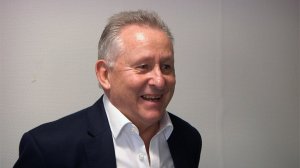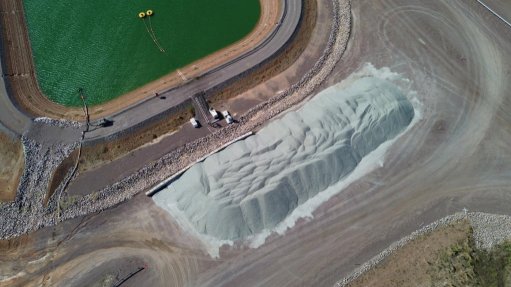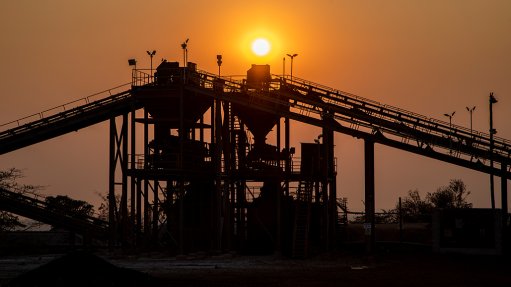Major shift to green energy under way by mining houses across Africa – Nedbank CIB

Nedbank CIB's Mike Peo interviewed by Mining Weekly's Martin Creamer. Video: Darlene Creamer.
JOHANNESBURG (miningweekly.com) – Virtually every mining house in South Africa is in the process of procuring green electrons, and similar advances are taking place across the African continent, from the Democratic Republic of Congo and Central African Republic, to Zambia and beyond.
‘We’re seeing a massive shift,” Nedbank CIB head of infrastructure, energy and telecommunications Mike Peo outlined to Mining Weekly in a Zoom interview. (Also watch attached Creamer Media video.)
Earlier this year, Peo attended the Africa Energy Forum, in the company of politicians and public sector officials from across Africa, where it is making good economic sense for financial institutions to be investing increasingly in green energy.
“Within the Nedbank Group, we have a commitment from our board to allow us to participate in green energy projects, and we’re going full steam ahead.
“I certainly cannot remember a time when our pipeline of projects in the green energy space was as heavy as it is now,” added Peo.
Those investing in renewable energy are doing so because the economics make sense, even ahead of carbon tax imposition, and across the continent, transmission is probably the most important factor constraining the ability to switch from dirty electrons to clean ones.
As a result of transmission constraints, decentralised generation from smaller power stations is envisaged to ensure the provision of power to remote locations.
“These are developing to be able to give populations, firstly, access to power, and then, secondly, as a consequence, access to green power,” Peo explained.
Mining Weekly: Tell us about the Africa Energy Forum event placing emphasis on the need for Africa to remain green and clean when it comes to the generation of energy on the continent.
Peo: By way of background, the African Energy Forum is a conference that has been held for probably the last 20 years. It’s probably the single biggest conference that brings together in one place a combination of politicians, regulators, project developers, project sponsors, bankers, lawyers, technical advisers. It’s probably the pre-eminent conference that gets together to discuss the problems that we encounter and hopefully the solutions that are needed to try and tackle what sometimes seems like a fairly insurmountable problem. The negative part of the conference was that many of the participants are still talking about the fact that the African continent has more than 700-million people that don't have access to energy on a daily basis. While this number has been pretty constant for 20 years, it's a combination of while we’re making great strides in some regions in Africa, the population growth story means that the numbers are remaining reasonably constant.
The big theme of the conferences over the last five years has been around energy transition. Every country on the continent has adopted a form of net-zero commitment, a commitment to decarbonisation and climate change is top of agenda, but the narrative has changed and shifted very much to a just energy transition, which means fundamentally that it's impossible for the continent to switch off coal, oil, gas, etc, overnight and just switch on green electrons, whether in the form of PV solar power, wind power, hydropower, et cetera. The financial commitment, the amount of money that is needed to make that transition, is virtually impossible. A lot of time and energy is being spent on finding how to transition out of areas such as oil- and gas-fired power stations to green energy power stations. That was the one key theme that did come out and the second key theme is that across the continent, transmission is probably the most important factor constraining the ability to switch from dirty electrons to clean electrons.
Each country has significantly different problems. A country like Namibia, for example, while very small in population size, is very vast, and to try to get transmission up and down the country is still a significant challenge. Those were the two big key themes. But the transition is happening. People are talking about distributed generation, moving away from centralised, massive power stations to many more, smaller power stations where you are able to locate these in rural areas. Again, the more you do decentralised generation, the more you're able to serve areas that are constrained because of things like transmission lines.
Which African region appears to be in the lead when it comes to the generation of green electrons and green molecules on the continent?
In relative size and scale, it has to be South Africa. It's not always a popular thing, because many of our neighbours further north believe that they're doing a very good job. But given the size of our total installed capacity and the percentage that is actually green, I think we’re doing a very good job, alongside probably a country like Kenya, which is also doing an exceptionally good job. But the liberalisation that has been happening with the South African market has led to the private sector, for example, procuring as much, if not more, green electrons, or being busy building those green electrons, than, for example, what Eskom has procured. So, I think we are doing the best job, and I think we certainly are moving very quickly in that space.
Is enough being done to take up the many opportunities that mining offers to advance green electron generation, and green molecule production in Africa?
I think very much. Most of the mines that are owned by global mining houses have absolutely committed to net-zero targets, and as a result of those net-zero targets, are trying very hard to procure green electrons. There are probably three main drivers of that. Number one, major mining groups have got very serious net-zero decarbonisation commitments. They are committed to meeting those, so they are procuring very hard. But, over and above that, across a lot of the continent, you have a combination of the costs of things like diesel-fired generators, diesel-fired power, compared to, for example, renewable energy in the shape of PV solar, plus potentially batteries. The price points are shifting quite dramatically, so there's an economic imperative to shift, and then it's around security of supply as well. Those three factors have led to virtually every mining house in South Africa being in the process of procuring green electrons, and we're seeing that absolutely across the continent, from the Democratic Republic of Congo, Central African Republic, Zambia, et cetera. We’re certainly seeing a massive shift by the mining houses themselves.
What are Africa’s strengths when it comes to transitioning to clean energy?
Our strengths are very much our good endowment of sun and wind resources. Many of the African countries do have very good hydropower capabilities. We have water in a lot of the regions and where there are dams we're able to tap some degree of hydroelectricity. But on the flip side, our constraints are transmission networks. In very many of the slightly more rural areas, the ability to do decentralised, small scale PV, is displacing diesel-fired generators, which are generally, apart from being very dirty, very expensive, and we’re seeing massive shifts into mini- and microgrids. These are developing to be able to give populations, firstly, access to power, and then, secondly, as a consequence, access to green power.
What would befall Africa if it turns its back on the critical need to transition to clean electrons and molecules?
It's a very contentious debate right now, but to put it into context, there are not that many countries on the continent that actually do produce coal at scale, or oil or gas. Major countries, for example, Nigeria, need to transition. South Africa needs to transition because of the quantum of coal or oil or gas that we happen to currently produce. But certainly there is no question that it's becoming easier to raise money for renewable-energy projects. Many multilateral agencies, the large development finance institutions, are categorically shutting down any ability to finance coal, oil and increasingly gas, so access to capital will be constrained if people do not shift. Where we are seeing some really excellent examples of a proper transition would be in a country like Mozambique, where major projects have been developed, but on a transition pathway, where a major gas project was financed by a number of global development finance institutions, but on the basis that it is a transition pathway to, ultimately, renewable energy. Without making those commitments, countries will find it more expensive to raise capital or find out that many large power projects are financed with huge amounts of debt. Certainly, the banks are being pressurised not to finance fossil fuels any longer, and by 2030, and thereafter, it's going to be very difficult to raise money for projects that are not green.
Was awareness about South Africa’s Hive green ammonia project at Coega heightened by the event?
Certainly, the whole green hydrogen taxonomy is becoming far more important. Major projects are being showcased. Nowadays, when there’s a major power conference, green hydrogen per se, becomes a very important part of that. Most of the approximately 18 projects in South Africa were showcased. But the Hive green ammonia project is a major project that has been developed in the Eastern Cape. It's a 450 MW electrolyser, a very large project, which will export ammonia into either the East or the West, so, yes, it very much did get a lot of attention and around all of the components that are required to make it happen, such as port infrastructure, transmission infrastructure, et cetera.
Is enough emphasis being placed on the need to develop the skills for the green transition?
The Energy Council of South Africa has done fantastic work in promoting a collaboration with Eskom to help sort out some of the critical skills that are becoming problematic, and work has been done on unlocking grid transmission rules et cetera. The single biggest issue that I'm going to say that we are sitting with at the moment is this lack of capacity. It's a lack of engineers, it's a lack of technicians, it's a lack of people at the levels of procuring on a big scale. Eskom’s national transmission plan is a world-class plan, but my reservations are around the capacity to implement this. It happens literally from the Ministries down, the planning and policy teams that are being engaged. We’re talking about building trillions of rands worth of new transmission lines, the ability to integrate those transmission lines, to get them into the right places at the right time, to deliver electrons into areas; we have a critical skills shortage problem right now. We are still continuously hearing that our major international partners, who have invested in, for example, the green electron production process, building green power plants, are still experiencing issues relating to things like visas, and the ability to get visas for the people that are needed to come and work on these plants. That should be a massive focus. On a better note, for example, there is work being done on developing a Green Hydrogen Valley into the Eastern Cape, into the Coega region, and the Nelson Mandela University is playing a major role in working out how it's going to upskill and create the necessary engineering courses that are needed to transition into a green hydrogen world.
What steps are financial institutions, including Nedbank CIB, taking to help the continent to do the right thing environmentally?
Most of the financial institutions have made their own net-zero commitments, and we all have guide paths where we commit to ultimately shifting away entirely from financing high-carbon industries to zero-carbon industries. Financial institutions play a massive role. Without that capital, these projects just don't go ahead and we have some examples in South Africa, where, as a result of banks refusing to finance new coal-fired power stations, those projects did not go ahead. So, there's a very important political lobby, and certainly it makes very good economic sense for us to be investing increasingly in green.
Can protecting the environment be done competitively?
I believe, absolutely, it can. Right now, there is a little bit of a disconnect in that South Africa, for example, does not have a carbon tax in place yet, so we're not competing on a level playing field. People that are investing in renewable energy are doing so because the economics make sense. But when a carbon tax is imposed, the true economic consequences of not shifting and transitioning into something green, is going to be felt. So, the net-zero commitment of most of our major industrial players, for example, is because they realise the consequence of that. They realise that there is a double whammy, made up of the cost of raising capital if you are not decarbonised, and the consequence of a carbon tax. If Eskom and Sasol, for example, were hit with carbon taxes today, there would be fairly serious economic consequences. I think protecting the environment is an imperative and I think everybody has accepted and understood that. The timelines and the pathways to that are now really the most critical things.
Article Enquiry
Email Article
Save Article
Feedback
To advertise email advertising@creamermedia.co.za or click here
Announcements
What's On
Subscribe to improve your user experience...
Option 1 (equivalent of R125 a month):
Receive a weekly copy of Creamer Media's Engineering News & Mining Weekly magazine
(print copy for those in South Africa and e-magazine for those outside of South Africa)
Receive daily email newsletters
Access to full search results
Access archive of magazine back copies
Access to Projects in Progress
Access to ONE Research Report of your choice in PDF format
Option 2 (equivalent of R375 a month):
All benefits from Option 1
PLUS
Access to Creamer Media's Research Channel Africa for ALL Research Reports, in PDF format, on various industrial and mining sectors
including Electricity; Water; Energy Transition; Hydrogen; Roads, Rail and Ports; Coal; Gold; Platinum; Battery Metals; etc.
Already a subscriber?
Forgotten your password?
Receive weekly copy of Creamer Media's Engineering News & Mining Weekly magazine (print copy for those in South Africa and e-magazine for those outside of South Africa)
➕
Recieve daily email newsletters
➕
Access to full search results
➕
Access archive of magazine back copies
➕
Access to Projects in Progress
➕
Access to ONE Research Report of your choice in PDF format
RESEARCH CHANNEL AFRICA
R4500 (equivalent of R375 a month)
SUBSCRIBEAll benefits from Option 1
➕
Access to Creamer Media's Research Channel Africa for ALL Research Reports on various industrial and mining sectors, in PDF format, including on:
Electricity
➕
Water
➕
Energy Transition
➕
Hydrogen
➕
Roads, Rail and Ports
➕
Coal
➕
Gold
➕
Platinum
➕
Battery Metals
➕
etc.
Receive all benefits from Option 1 or Option 2 delivered to numerous people at your company
➕
Multiple User names and Passwords for simultaneous log-ins
➕
Intranet integration access to all in your organisation



















